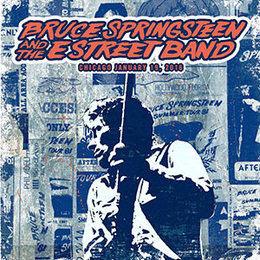 by Julian Spivey Bruce Springsteen and the E Street Band were forced to cancel their concert at New York City’s Madison Square Garden on Sunday, Jan. 24 due to Winter Storm Jonas – which shut down much of the northeast. Springsteen feeling bad for his loyal legions of fans decided to make up for the cancellation by giving the entirety of his fan base over three hours of free, live music. Springsteen’s website started offering downloads of live concerts last year for about $10 a show, but for two days only (beginning Sunday night and ending this evening around 7 p.m.) Springsteen is offering his most recent concert from Chicago on Jan. 19 for free. Springsteen said through his social media platforms: “Out here on E Street we’re missing our fans at The Garden tonight and wanted to send this along.” The Chicago show from last Tuesday featured an incredible 33 performances, included the entirety of his 1980 double album The River from start-to-finish, which he’s doing at every show on the tour named after that album. Some of Springsteen’s most iconic songs, not released on The River, were also brought out for the Chicago crowd last week and are available on this free download like “Born to Run,” “Thunder Road,” “Rosalita (Come Out Tonight),” “Dancing in the Dark” and “The Rising.” The Chicago show, which was performed at the United Center, also featured a performance of “Take It Easy,” in tribute to Glenn Frey who had died the day before the show. “Take It Easy” was co-written by Frey and long-time Springsteen friend Jackson Browne and became The Eagles’ first hit in 1972. This is simply an offer that Springsteen fans, and really anybody who loves great music, can’t pass up. You can receive your free download by clicking HERE. Springsteen will resume his The River tour on Wednesday, Jan. 27 at Madison Square Garden. A makeup date for the performance that was canceled on Sunday at the same venue has yet to be announced.
0 Comments
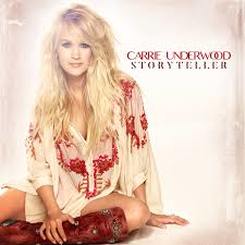 by Aprille Hanson Carrie Underwood’s fifth studio album Storyteller lives up to its title more than most albums actually played on country radio. It’s hardly the contemplative album that will go down in music history, but it’s one that goes back to her Southern roots. The 13-track album is both classic and new. Underwood is not a pop diva, but she’s not wandering the backwoods with a shotgun either. She’s a mix of country royalty meets small-town girl, something only she has really been able to pull off of late with recent success. It’s that same persona Reba embodies, which gives Underwood the freedom to experiment with new sounds or go back to some more traditional pieces without alienating her audience. Her first single out of the gate “Smoke Break,” which she co-wrote, is one of the purest country songs she’s ever done. It easily could have been released by someone like Miranda Lambert or Ashley Monroe, whose music tends to be a little more edgy and traditional. But Underwood sells it. She taps into this hardworking mentality of Southern people without going straight into dirt road clichés. It’s extremely relatable, with everyone at one point or another needing to find time for whatever vice they have, their own “smoke break” to escape the stresses of life. It’s a song that could have been released on ’90s country radio and been a hit. For as country as “Smoke Break” sounds, it doesn’t have the deep twang factor of “Choctaw County Affair.” It’s likely one of the most unique songs Underwood has ever released, taking on the persona of a tough Southern girl in Mississippi who is on trial with her lover for the murder of the self-righteous Cassie O’Grady. In October, she told 95.7 Duke FM in Tennessee that the album took its shape after she found that song, saying “There was just something so, like it was simple but it was like swampy and twangy and it was a story and there was just something laid back and cool about it.” Anyone who has heard her more pop-infused, soulful songs like the brilliant “Something in the Water” and wondered how she fits in country music will remember why on this song. Her singing the line “And now they say she’s lying dead somewhere” with a long, clear twang is a mic drop moment. There are several signature Underwood stylings on the album including “Dirty Laundry,” “Like I’ll Never Love You Again” and “Chaser.” “Renegade Runaway” is probably the closest to others in her repertoire -- it’s essentially the female-warning version of “Cowboy Casanova.” “Mexico,” again done in a Lambert-style, is pure fun about committing a crime and escaping to Mexico to dodge the police. It’s one of those songs that Underwood can let her powerhouse vocals run wild on, which is always a treat for her fans. Her second single “Heartbeat” was predictably for radio. It’s a sweet song and the clichés of a harvest moon, driving out into the country and being in her “bare feet” with her man, are not too overdone like so many on the radio. “Relapse” has the right amount of crescendos to build the tension, comparing a past relationship and the mistake of going back to it to a drug or alcohol addiction relapse. “Clock Don’t Stop” is probably the most pop sounding track on the album -- which will undoubtedly be a single -- along with “Church Bells.” ‘Bells’ is essentially “Two Black Cadillacs” meets Lambert’s “Gunpowder and Lead.” It’s a good, but very predictable song that’s trying to be more profound than it is. This cheese-fest of a line doesn’t help either: “Everyone thought they were Ken and Barbie / but Ken was always gettin’ way too drunk.” Two songs, which she co-wrote, stand out as purely classic Underwood: “The Girl You Think I Am,” an ode to her father and the sweet “What I Never Knew I Always Wanted” about her marriage and new baby Isaiah. It hearkens back to her first album Some Hearts, giving listeners a glimpse into how she feels about her life and those she loves. Storyteller is really a defining moment in her collection. Underwood is at a new stage in her life as a wife and mom and the growth is evident on this album. She’s truly her own story in country music that’s far from over. 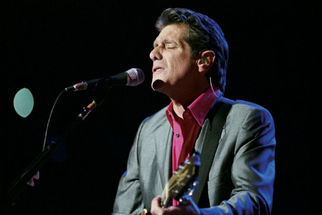 by Julian Spivey “There’s gonna be a heartache tonight/a heartache tonight/I know” Eagles fans everywhere must be suffering through heartache tonight after the news came on Monday, Jan. 18 that founding member Glenn Frey had died at age 67 from complications of pneumonia, rheumatoid arthritis and acute ulcerative colitis. The Eagles were arguably the most popular American band in the history of rock music, with album sales ranking them as one of the biggest bands in the history of popular music. Frey, along with co-founder Don Henley, was the heart and soul of the Eagles – this means that we haven’t just lost a legendary singer-songwriter, but also effectively one of the greatest musical groups of all-time. I couldn’t imagine the Eagles without Frey and I hope they can’t either and surviving members Henley, Joe Walsh and Timothy B. Schmit don’t try to keep the group going without him. I sincerely doubt Henley would ever allow it. It turns out that I was lucky enough to see Frey and the Eagles at the very end – having no way of knowing it would turn out that way. Their “History of the Eagles” tour stopped off in Little Rock, Ark. in late July of last year – their second-to-last show on the tour, which effectively made it their second-to-last show ever. I was in the nose bleeds as far up as I possibly could be at Verizon Arena, but am so thankful I had the opportunity. I was entranced by the group – particularly Frey and Henley – from start to finish. Had I passed that one up I never could have forgiven myself. Frey sometimes gets lost in the shuffle in a group that includes Henley and Walsh – who’ve had exemplary and famous solo careers outside of the Eagles. Frey had some solo hits too, but not to the same level as his bandmates. But, Frey shouldn’t ever be a forgotten member of the Eagles as one of the two founders of one of the most successful bands of all-time. I don’t know that I have a favorite Eagle – because Frey and Henley both have so many incredible songs through their respective tenures taking lead on certain songs – but if I were to rank my favorite Eagles songs Frey would probably have more in the top 10 than his bandmates, possibly even combined. Frey was from Detroit Rock City, but he had this Western flare to his vocals – probably something he adapted to living out west in California during an era of Gram Parsons and the Byrds, playing in a backing band for Linda Ronstadt and teaming with Texan Don Henley. As a fan of both rock and country music this mixture – perfected in the vocal stylings of Frey – really spoke to me as a music lover from an early age. Frey’s voice, mixed with the group’s musicianship on tunes like “Peaceful Easy Feeling,” “Take It Easy,” “Tequila Sunrise” and “Lyin’ Eyes” not only made for one of the most unique combinations of musical genres in the history of popular music, but inspired many future singer-songwriters in both rock and country – as the Eagles tribute album Common Thread, which won the CMA (Country Music Association) Album of the Year award in 1994 and featured some of the era’s biggest country superstars could attest. Frey – along with Henley – is one of the most important artists when it comes to today’s music because their combination of country-rock essentially gave birth to the Americana genre – a genre mixing together sounds from a multitude of American roots genres. Many of my favorite and this country’s brightest artists come from this mixture of genres and without Frey and the Eagles paving the way it’s likely none of them might exist. I would say that of the Eagles’ co-founders that Henley had the smoother vocals, but it was the sheer Americana aspect of Frey’s voice on songs like “Peaceful Easy Feeling” and “Tequila Sunrise” that will forever mean “Eagles” to me. 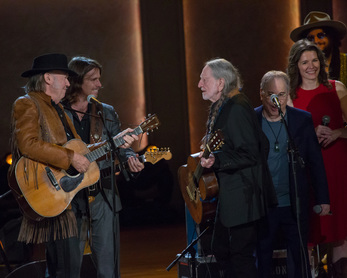 by Julian Spivey Willie Nelson received the prestigious Gershwin Prize for Popular Song in November during a ceremony at the Library of Congress in Washington D.C. The ceremony aired on PBS on Friday, Jan. 15 and featured such legends as Neil Young and Paul Simon, as well as contemporary artists like Alison Krauss, Jamey Johnson, Leon Bridges and Raul Malo performing many of Nelson’s most memorable and best works. Nelson holds the honor of becoming the first country music singer-songwriter to be awarded the Gershwin Prize and there couldn’t have been a worthier choice. The ceremony kicked off with Nelson’s Farm Aid buddy Neil Young performing a rip-roaring “Stay A Little Longer” with Promise of the Real, a rock band led by Nelson’s son, Lukas. Stunning R&B newcomer Leon Bridges swooned the crowd full of Washington dignitaries with a cover of Nelson’s standard “Funny How Time Slips Away” before The Mavericks lead singer Raul Malo put forth one of the greatest covers of the Nelson written “Crazy” that’s likely ever been heard. Paul Simon and his wife Edie Brickell performed a terrific cover of Nelson’s “Remember Me,” from his iconic 1975 alum Red Headed Stranger – which Simon told the audience that Brickell had first played for him. Simon would return to the stage later in the ceremony for another fantastic performance of “Man with the Blues” with New Orleans music legend Buckwheat Zydeco on accordion. Alison Krauss and Jamey Johnson – two of country music’s brightest performers – entertained the crowd with solo performances of “Angel Flying Too Close to the Ground” and “Georgia On My Mind,” respectively, before dueting on a special performance of “Seven Spanish Angels,” which Nelson and Ray Charles took to No. 1 on the country music charts in the early ‘80s. Among the other terrific performances during the 90-minute PBS special were Rosanne Cash’s take on the Townes Van Zandt song “Pancho & Lefty,” which Willie and Merle Haggard recorded in the early ‘80s and took to No. 1 on the charts, Mexican hit-maker Ana Gabriel singing a Spanish language rendition of “I Never Cared for You” and Young and Promise of the Real returning to the stage for a low-key performance of the Nelson regular “Whiskey River.” Nelson then took the stage to thank the Library of Congress and the audience by saying the Gershwin Prize was one of the greatest moments of his career and 82-year long life. The special ended with Nelson performing a few tunes of his own beginning with “Night Life,” an early hit he wrote for late friend Ray Price, a duet of George and Ira Gershwin’s “Let’s Call the Whole Thing Off” with Cyndi Lauper (which the two recorded for Nelson’s upcoming tribute to the Gershwins), a fitting performance of “Living in the Promised Land” with his sons Lukas and Micah. Nelson ended the night by inviting all of the night’s performers back onto the stage for an all-star rendition of what’s become likely his most famous song “On the Road Again.” 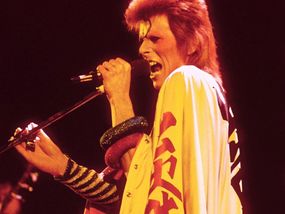 by Julian Spivey David Bowie, Rock & Roll Hall of Famer and music legend, died on Sunday, Jan. 10, just two days after his 69th birthday, after a secretive 18-month battle with cancer, according to his publicist and family. It’s a miracle any news this big could be kept quiet for 18 months, especially when it’s a star of Bowie’s stature, but Bowie always seemed to be one of music’s more private superstars. In fact, you could argue Bowie’s entire life was a secret – as the singer-songwriter mostly wrote like a fictional author and not necessarily telling tales of his own life. Maybe that’s unfair and not necessarily true and shows my ignorance of Bowie’s complete body of work, but you see the artist, who I greatly respect, wouldn’t really make the list of my 25 favorite artists. This is not to say I’m not a fan – I am. I really enjoy much of Bowie’s work – just not enough to consider myself a super fan like I am with a Bruce Springsteen, Merle Haggard or Johnny Cash. But, Bowie is one of the most important figures in the history of rock and popular music – not necessarily for what he put to paper with his pen (though much of it brilliant), but for how he portrayed his music. Bowie basically fathered the entire subgenre of rock music known as glam rock – which artists like Alice Cooper and KISS would take and run with. Bowie writing songs such as “Space Oddity,” “Ziggy Stardust,” “Starman” and others gave him an otherworldly quality that he would play up on stage dressed as the fictional Ziggy Stardust himself in “out there” fashion and makeup. Bowie also played around with the idea of sexuality throughout this period, which brought the term “androgyny” to the rock & rock scene. His alter-ego Ziggy was an androgynous alien. This point in his career made Bowie a life-long gay icon, and he became really the first big rock star to identify as bisexual – even though he’d later admit it was all a part of his backstory, though some would argue it was indeed true. Fashion designer Raf Simons once said of Bowie: “He’s a chameleon, able to reinvent himself. But he’s also the materialization of something else. More than a man – an idea.” What Bowie was most was weird – and that’s meant as a compliment of the highest honor. Bowie’s weirdness and uniqueness is really what made him stick out (not to take away from his brilliantly scripted short stories to music). It also made waves of people flock to him because he allowed them to realize they could be weird and everything would be OK. It was suddenly OK to be flamboyant or “out there” or just not of the norm. Too often in this world (particularly in America) – even surprisingly in the beginnings of 2016 – we’re told that we have to look or act a certain way. And, when we don’t we’re ostracized or made to feel wrong or different because we aren’t what society expects us to be. It’s all really bullshit and Bowie was maybe the first popular star to show in his own special way that it was indeed bullshit. I never want to be normal. Nobody really should. Normal is boring. Normal is oftentimes ignorant. I want to be unique, strange, different, original. Because of this I respected the hell out of David Bowie. Because of this I’ll miss David Bowie. But, his impact will be lasting. He made it cool to be weird. |
Archives
July 2024
|